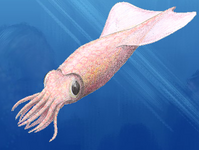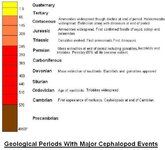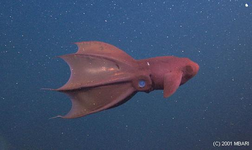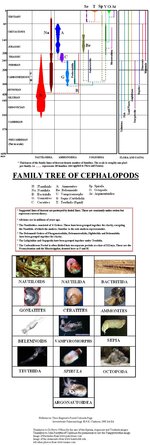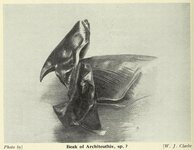Articles by Phil
Introduction
Imagine yourself standing on a bleak windswept Ordovician shore. It is 470 million years ago and you are standing on a rocky coastline staring out to sea. As you turn and pan the landscape behind you, all you can see are barren rocks, with no trees, plants or any form of animal...
- Original publish date
- Jul 15, 2004
Note: Phil Eyden welcomes discussion on this article in the Cephalopod Fossils forum.
Introduction
Architeuthis and Mesonychoteuthis, the giant and colossal squid, are enigmatic and awe inspiring animals. Very little is known about the lifestyle of these spectacular animals, despite the...
- Original publish date
- May 18, 2004
Note: Phil welcomes discussion on this article in the Cephalopod Fossils forum.
Fossil Octopuses
Fossils of octopuses are by far the most enigmatic and mysterious of all the ancient groups of cephalopods. Due to their delicate structure fossils of these animals are exceptionally rare, as the...
- Original publish date
- Nov 19, 2004
Note: Phil welcomes discussion on this article in the Cephalopod Fossils forum.
Introduction
Belemnites are probably the most well known extinct cephalopod after the ammonites. They are quite common fossils and have a worldwide distribution. They are a very characteristic and easily...
- Original publish date
- Sep 14, 2003
By Phil Eyden
Note: Phil welcomes discussion on this article in the Cephalopod Fossils forum.
Ammonites are extinct cephalopods and are among the most abundant and beautiful of all fossils. Although not as glamorous as Tyrannosaurus rex or as dramatic as Velociraptor, these extinct creatures...
- Original publish date
- Apr 29, 2003
By Phil Eyden
Note: Phil welcomes discussion on this article in the Fossils and History forum on the Message Board.
Introduction
Folkestone is located at the extreme southeast tip of England. It is a port-town with a small harbour and is roughly about 30 miles away from France. Folkestone...
- Original publish date
- Apr 24, 2004
Note: Phil welcomes discussion on this article in the Cephalopod Fossils forum.
Vampyroteuthis infernalis
One of the most interesting, popular, and intriguing of all living cephalopods is that of Vampyroteuthis, the Vampire Squid. To follow is a brief look at this 'living fossil', its...
- Original publish date
- Nov 29, 2005
History has regarded cephalopod fossils in interesting ways...
By Phil Eyden, 2004
INTRODUCTION
Before the mid eighteenth century the origin of fossils was generally regarded in terms of superstition and myth. Many differing accounts across different cultures explained how these fossils...
- Original publish date
- Mar 20, 2004
Cephalopod through the ages
By Phil Eyden
May 2018 edit - also see this update from @Danna reflecting research through 2017!
- Original publish date
- Mar 19, 2004
Only two Giant squid have ever been washed ashore in England. Although half-a-dozen have come ashore in Scotland and Ireland or been caught in nets in the North Sea, the tale of England’s Architeuthis is a curious one.
Early on 14 January 1933, a group of bathers spotted a rather strange, inert...
- Original publish date
- Feb 23, 2020
The Natural History Museum (2002). ISBN 0-565-09169-7
160 pages softback.
Review by @Phil Eyden
Ammonites are one of the first fossils we all hear about at school. We all know they were related to squids and octopi, generally have spiral shells and died out along with the dinosaurs 65...
- Original publish date
- Aug 1, 2005




